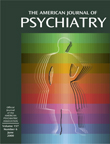Relation of Familial Schizophrenia to Negative Symptoms But Not to the Deficit Syndrome
Abstract
OBJECTIVE: Although a family history of schizophrenia has been associated with negative symptoms, family history is inconsistently related to the presence of the deficit syndrome.METHOD: The authors assessed family history and the deficit syndrome in 99 patients with DSM-III-R-diagnosed schizophrenia who were assessed during clinical treatment. Of these 99 patients, 45 were assessed both while antipsychotic free and during antipsychotic treatment to index their treatment response.RESULTS: Patients with (N=39) and without (N=60) a family history of schizophrenia had similar proportions of the deficit syndrome. Yet family history and deficit syndrome categorizations identified a group with greater negative symptoms on the Positive and Negative Syndrome Scale. Those with a family history had greater emotional withdrawal, poor rapport, and lack of spontaneity. Groups with and without the deficit syndrome similarly differed in these symptoms but also in affective blunting, motor retardation, and passive or apathetic social withdrawal. The study involving antipsychotic-free and antipsychotic treatment phases showed main medication effects explaining positive, psychopathology, depression, and activation symptoms but not negative symptoms. Only patients without a family history had improved negative symptoms with antipsychotic treatment.CONCLUSIONS: Patients with a family history of schizophrenia had greater and more treatment-resistant negative symptoms than those without a family history. They were not more likely to have the deficit syndrome. The group with a family history had more pathology only in negative symptoms related to psychosocial function. The stable negative symptoms specifically related to the genetic vulnerability to inherit schizophrenia might be those associated with psychosocial functioning.



